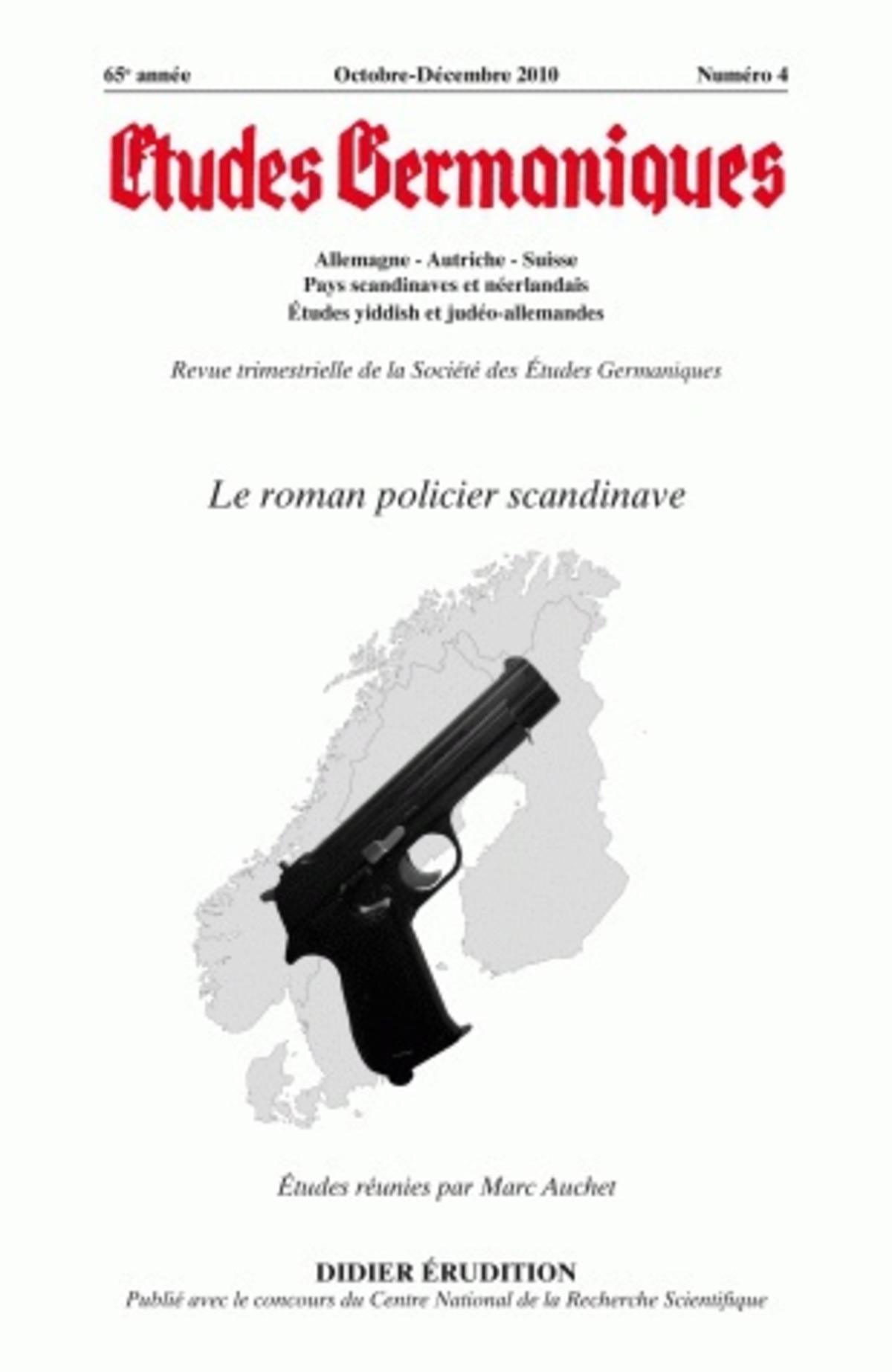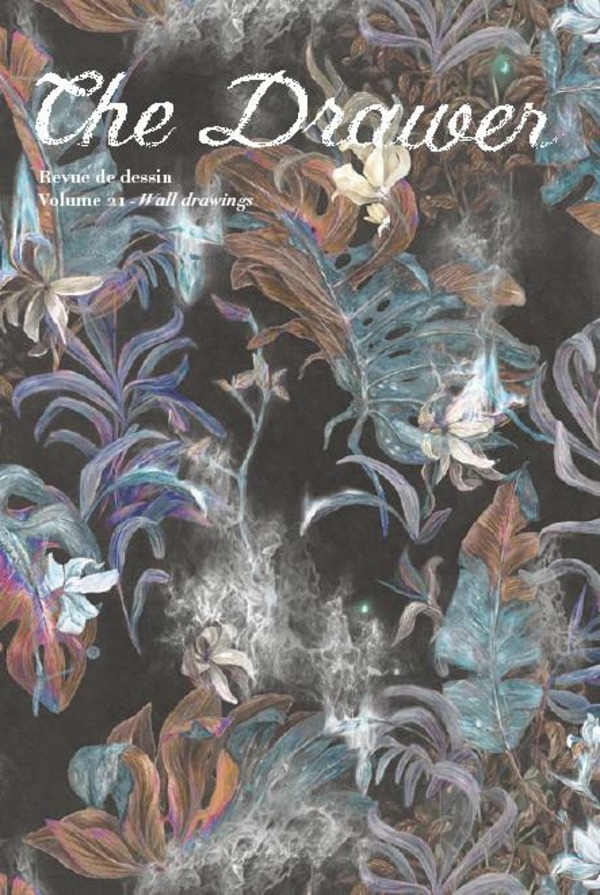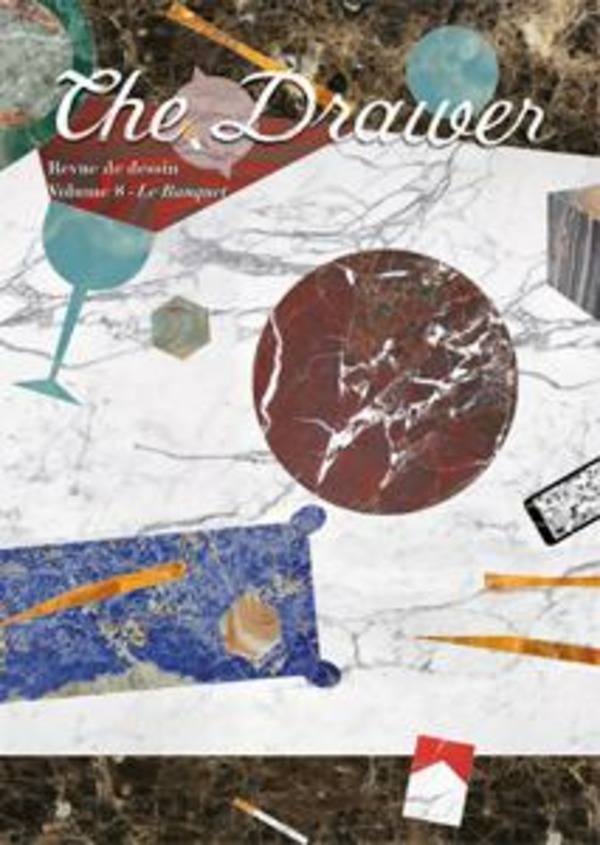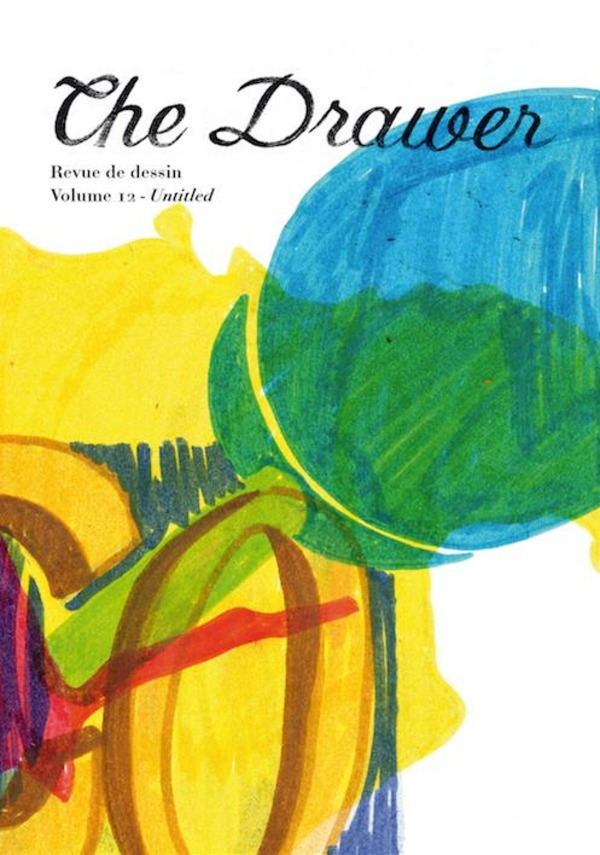Études germaniques - N°4/2010
Le roman policier scandinave

- 280 pages
- Livre broché
- 15 x 23 cm
- Études germaniques
- Parution : 24/02/2011
- CLIL : 3146
- EAN13 : 9782252037591
- Code distributeur : 36167
Présentation
Hans H. SKEI - Le roman policier norvégien dans le contexte scandinave hier et aujourd'hui
In this essay I offer a brief introduction to Scandinavian crime writing, with heavy emphasis on the last couple of decades, before I move on to a brief and very general survey of Norwegian crime fiction from its beginning to the mid-1970s. Most attention is, however, given to contemporary Norwegian crime writing.
Denne artikkelen er en kort innføring i skandinavisk kriminallitteratur, med sterk vekt på de siste par tiårene, før den gir en kort og svært generell oversikt over norsk kriminallitteratur fra begynnelsen til midt på 1970-tallet. Mest oppmerksomhet får den nyeste norske krimlitteraturen.
Johan WOPENKA - La littérature policière suédoise moderne : policiers, femmes et étude sociale
Up until the last few years, Swedish crime fiction lived a rather modest life, seen from an internationally point of view. During the first decade of the 21st century the picture changed dramatically : a row of Swedish crime novels have not only been translated, but are also best-sellers in many countries. In the article the story of Swedish crime fiction is told, and the publications of today in Sweden are scrutinized and discussed.
Fram till det senaste åren förde svensk kriminallitteratur en tämligen blygsam tillvaro internationellt sett. Under 2000-talets första decennium ändrades bilden markant : en lång rad svenska kriminalromaner har inte bara översatts, utan också sålt i stora upplagor i många länder. I artikeln skildras den svenska kriminallitteraturens historia, samtidigt som dagens utgivning i Sverige granskas och diskuteras.
Anton KOCH-NIELSEN - La littérature policière danoise — un bref aperçu
This article gives a broad survey of the history of the Danish Whodunit. The most important authors are briefly presented, especially those who stood out in the course of the last 20 to 25 years, a period during which suspense literature ensured great success. In the last 10 years many more thrillers have been published in Denmark and feminine writers have emerged while until then this genre had only been reserved for men.
Artiklen er et rids af udviklingen af den danske krimi. De vigtigste forfattere opregnes og præsenteres kortfattet. Det gælder især de forfattere, der har gjort sig gældende de seneste 20-25 år, hvor spændingslitteraturen har været i vælten. I det seneste tiår er der sket en voldsom stigning i antallet af danske krimier. Samtidig er en håndfuld kvindelige forfattere trådt til — efter at genren indtil da stort set kun havde kaldt på mænd.
Gunhild AGGER - Histoire et culture médiatique. Le roman policier historique en Scandinavie
This article opens on the question of a new form of historical transmission of media culture: Does it lead to "fantasy history" or is it used in a more unusual and creative fashion? From this general question the article sketches a short story of the historical thriller in England, the USA, and Scandinavia and provides a new typology and analysis of the functions History can have in combination with detective stories and thrillers. From the time of Occupation we will show how these functions assert their positions in three main types of historical thrillers. Historical thrillers provide many examples of “fantasy history”, but can also shatter stereotyped representations of history.
Artiklen introducerer indledningsvist en problematik, fremkaldt af den stigende genreorientering i mediekulturens historieformidling : Fører den til “kulørt historie” eller bliver den udmøntet mere kreativt ? På baggrund af denne generelle prob-lemstilling giver artiklen et kort rids af den historiske krimis historie i England/USA og Skandinavien og foreslår en ny typologi. Spørgsmålet om, hvilke funktioner historien kan have i kombination med krimien diskuteres. I sammenhæng med eksempler, der inddrager besættelsestiden, vises det, hvordan disse funktioner sætter sig igennem i tre af den historiske krimis hovedtyper. Det konkluderes, at den historiske krimi nok leverer mange eksempler på “kulørt historie”, men at den også formår at rokke ved stereotype forestillinger om historien.
Karsten WIND MEYHOFF - Paranoïa géopolitique. Le roman à suspense danois et quelques remarques
sur l'œuvre littéraire de Jan Stage
The article argues that the Danish spy novel at the moment is having a renaissance. To contextualise this thesis the history and the poetics of spy fiction is introduced, tracing the genre back to the 18th century and tracing its developments up til the present. The development of the genre is related to the generel social and political development in the era. The history of Danish spy fiction is then outlined in the light of the international trends. The Danish spy fiction writer Jan Stage is discussed as a central and often overlooked figure. Stages work is introduced in its geopolitical context and one of his most important works, Tree days before the rain (1992), is analyzed in more detail.
Artiklen argumenterer for, at thrilleren og spionromanen i Danmark for tiden ser en opblomstring. Indledningsvist introduceres spionromanens poetik og historie, der føres tilbage til 1800-tallet og herefter forfølges frem til nutiden. Genrens udvikling jævnføres med den generelle samfundsmæssige udvikling. Herefter introduceres den danske spionromans historie, som knyttes til genrens internationale tendenser. Den danske spionforfatter Jan Stage bliver fremhævet som en central og ofte overset aktør. Herefter skitseres konturerne af Stages værk i en geopolitisk ramme og diskuteres efterfølgende i forlængelse af især romanen Tre dage før regnen (1992).
Bo Tao MICHAËLIS - Fausse loyauté et psychologie poétique. Sur les traces de deux écrivains danois oubliés en tant qu'auteurs de romans policiers, Hans Scherfig et Ole Sarvig
Two Danish authors, the communist Hans Scherfig and the esthete and Christian poet Ole Sarvig, wrote thrillers which were never acknowledged as real “literature”. Scherfig used the English whodunit as a model for his depiction of satirical mores and Sarvig used the thriller The Chaser to describe the spleen and uprootedness of modern man.
To store danske forfattere i hver sin genre, den kommunistiske romanforfatter Hans Scherfig og den kristne poet og skønånd, Ole Sarvig skrev begge krimiromaner, som på en eller anden måde aldrig blev akcepteret som rigtig “litteratur”. Scherfig brugte den engelske “roman à énigme/whodunnit” som skabelon for sine satiriske sædeskildringer og Sarvig thrilleren The chaser som eksistentialistiske signalementer af det moderne menneskes spleen og rodløshed.
Peter KIRKEGAARD - Arne Dahl — le véritable héritier de Sjöwall et Wahlöö
This article describes the main features of an often underestimated subgenre, the Scandinavian novel of Police Procedural, based upon the famous novels of social critique by the Swedes Sjöwall and Wahlöö. Arne Dahl is considered today as their real heir, and his series of ten novels on the expert group called the “A-group” is a postmodern collective novel of great quality. Dahl combines a demanding art of plotting with an acerbic critique of society, a psychological depth not without humor, and a writing which has great artistic elegance.
Med udgangspunkt i karakteristikken af den oftest nedvurderede 'Police Procedural'-subgenre beskrives dens særlige skandinaviske egenart, med base i svenskerne Sjöwall og Wahlöö's berømte, samfundskritiske forfatterskab. Arne Dahl betragtes af mange som deres virkelige arvtager i dag, hans dekalog om det svenske ekspert-politi — “A-gruppen” kaldet — er gedigen postmoderne kollektivroman-kunst. Dahl forener fordringsfuld “plotting”, bidsk samtidskritik, psykologisk dybde med humor og artistisk legende skrivekunst.
Nils NORDBERG - La nuit tous les loups sont solitaires. Les romans policiers de Gunnar Staalesen
Gunnar Staalesen is one of the most eminent Norwegian writers of detective novels of all times. He introduced the American-style private detective into the Norwegian detective novel giving him local roots with the character of Varg Veum who appears in 18 novels, 23 short texts, 5 comics, and even on radio, theatre, cinema, and television. In 2004 he was chosen as the most popular Norwegian hero of detective novels. The article attempts to evoke the influences, forms, expression, and evolution of Staalesen's literary project.
Gunnar Staalesen er en av Norges fremste kriminalforfattere gjennom tidene. Han introduserte den amerikanske privatdetektiven i norsk krim og gav ham en lokal tilhørighet i skikkelse av Varg Veum, som hittil har opptrådt i 18 romaner, 23 kortere tekster og fem tegneserialbum, og dessuten i radio, på scenen og film/TV, og i 2004 ble kåret til tidenes mest opulære norske krimhelt. Følgende essay prøver å utsi noe om påvirkninger, former, uttrykk og utvikling i Staalesens kriminallitterære prosjekt.
Annie BOURGUIGNON - Nous qui pataugeons dans la boue. Le monde des romans policiers de Henning Mankell
Henning Mankell was the most popular Swedish writer of crime-stories of the 1990s, in Sweden as well as abroad. He is regarded as a master of crime-fiction and a keen observer of that period. The article tries to point out the most remarkable characteristics of his novels and focuses first on the structures of the narratives and the way how they implement suspense and surprise, and then on the image those narratives give of contemporary society and the changes in the aftermath of 1989.
Under 1990-talet blev Henning Mankell den mest populäre svenske deckarförfattare, i Sverige och utomlands. Han utnyttjar deckarlitteraturens berättartekniker mycket effektivt och skildrar sin samtid på trovärdigt sätt. Artikeln ämnar bidra till att belysa det som utmärker hans romaner. Den undersöker berättelsernas strukturer, hur Mankell använder sig av spänning och överraskningseffekter, samt granskar den bild hans romaner ger av det samtida samhället och hur gestalterna och författaren ser på den förändrade världen efter 1989.
Torfi H. TULINIUS - D'origine étrangère ? Arnaldur Indridason et le roman policier en Islande
The article studies the roots of Indridason's detective novels in Icelandic reality in its different manifestations, both in its recent and more distant history, in its contradictions and constraints, as well as in the country's literary heritage, especially the medieval sagas. The main focus is on Erlendur, the leading character. His name signifies “foreigner” and the choice of this Christian name is suggestive of what the author's intention was when he started out writing these novels, i.e. to import a foreign genre, detective fiction, into Icelandic literature. However, this name has more and more called to mind, as Indridason's work has progressed, another aspect of Erlendur. He is indeed a very strange character, definitely not at home in modern Iceland. For him the world of the dead is more vivid than the one that surrounds him. In this respect he reminds one of shamans from the medieval sagas.
Í greininni er leitast við að skilja hvernig glæpasögur Arnalds eiga rót að rekja til íslensks veruleika í ýmsum myndum, bæði í fjarlægri og nálægri fortíð, en jafnframt í mótsögnum íslenskrar menningar, auk þess sem bókmenntaarfurinn, einkum fornsögurnar, skipta þar mjög miklu máli. Megin athyglinni er beint að Erlendi, en nafn hans getur merkt að hann sé kominn til Íslands frá framandi landi. Þetta vísar til þess sem Arnaldur er að gera, þegar hann flytur erlenda bókmenntagrein, glæpasöguna, inn í íslenskan veruleika. En eftir því sem höfundarverki hans hefur undið fram virðist nafnið vísa til þess hversu framandi persóna Erlendur er í sjálfum sér, eins konar útlendingur í eigin landi sem lifir meira í heimi hinna látnu en þeirra sem lifandi eru, svolítið eins og seiðmaður úr fornöld.
Kim Toft HANSEN - Recherches philosophiques et roman policier. Le roman policier autoréflexif de Henning Mortensen
This article deals with the work of Henning Mortensen, and especially with his so-called Sondtrup trilogy. First it shows how Mortensen deconstructs metafictively the form of the detective story, then analyses the critique of society it contains despite the deconstructive elements. Finally it shows the philosophical implications of the use Mortensen explicitly makes of Wittgenstein's philosophy.
I denne artikel tager Kim Toft Hansen over tre trin fat på Henning Mortensens forfatterskab og primært dennes såkaldte Sondrup-trilogi. Første trin er at præcisere, hvordan Mortensen metafiktivt dekonstruerer krimiens form. Andet trin analyserer Mortensen samfundskritik, der dukker op trods de dekonstruerende elementer. Tredje og sidste trin fokuserer på de filosofiske implikationer i Mortensens eksplicitte brug af Ludwig Wittgensteins filosofi.
Alexander RUBEL - Zur Quelle der « Stereoskopischen Wahrnehmung ». Ernst Jünger und Karl-Joris Huysmans' À Rebours
Joris-Karl Huysmans, and especially his novel À Rebours, had a remarkable influence on the work of Ernst Jünger. As this paper will show, a celebrated passage from Huysman's fin-de-siecle novel of dandies and aesthetes had a strong impact on Jünger's concept of « stereoscopic perception ». This concept, « of extracting simultaneously from one and the same tone two sensational effects with only one organ of the senses », lies at the roots of the interpretation of Jünger's poetics. Jünger read and analyzed Huysmans' work intensively during the 1920s and 1930s. Besides other influences from Huysmans, he borrowed this concept of perception from À Rebours, and from the « organ of odours » (orgue a bouche) of the protagonist Des Esseintes.
Joris-Karl Huysmans, et en particulier son roman À Rebours, a eu une influence remarquable sur l'œuvre d'Ernst Jünger. Comme le montre cet article, un célèbre passage de ce roman de dandy et d'esthètes, À Rebours, a eu un fort impact sur le concept de « perception stéréoscopique » de Jünger. Ce concept, « extraire simultanément à partir d‘une seule et même tonalité deux effets retentissant avec un seul organe sensoriel », est fondamental pour l'interprétation de la vision poétique de Jünger. Jünger a lu et analysé en profondeur les travaux de Huysmans dans les années 1920 et 1930. En dehors des autres influences de Huysmans, il a emprunté ce concept de perception au roman À Rebours et à l'orgue à bouche du protagoniste Des Esseintes.
Biographies Contributeurs
Jean-Marie Valentin
Jean-Marie Valentin est titulaire de la Chaire d’Histoire culturelle du monde germanique à l’Institut Universitaire de France. Il dirige la collection Bibliothèque Allemande aux Belles Lettres.




